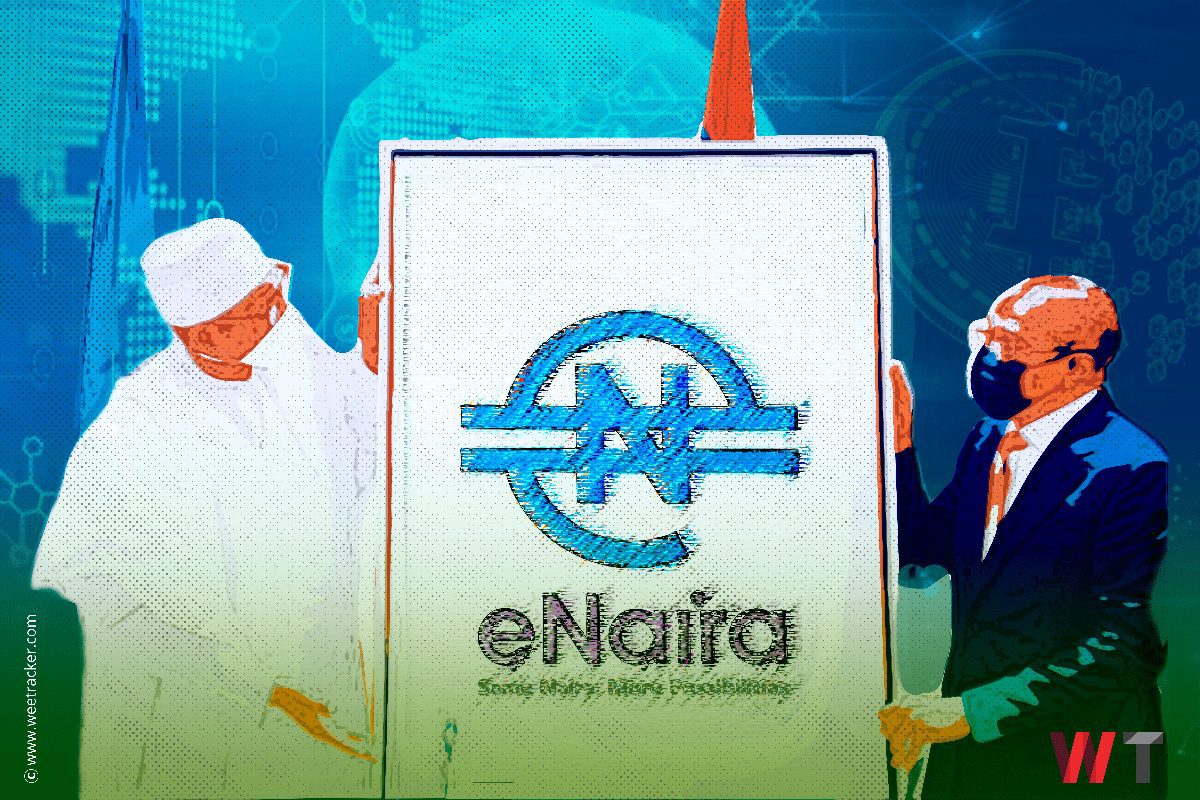Africa’s First Central Bank Digital Currency Is Struggling To Take Off

At last Friday’s IMF African Department Speakers Series, Kingsley Obiora, the Deputy Governor of the Central Bank of Nigeria (CBN) revealed USSD functionality as something of a next move to aid the penetration and usage of Nigeria’s national digital currency, eNaira, which has endured lukewarm reception since launch.
The new USSD funnel does seem like a genuine improvement on the product, though it also appears to be the latest effort in a so-far-futile attempt to promote a misfit and try to make it stick.
USSD, Obiora said, offered a viable path forward for the country’s Central Bank Digital Currency (CBDC).
“A lot of people might not have smartphones but that is essentially the next step of our improvement in the CBDC, to introduce the USSD code, so those that do not have smartphones can still transact,” Obiora said.
USSD transactions are quite popular in Nigeria, powering NGN 1.63 Tn (~USD 4 B) in payments in the last quarter of 2020. Although quite dated, it offers a reliable channel for distributing digital financial services, especially in a country where half the 200-million-strong population is estimated to be unbanked or underbanked.
But the fundamental propositions of the eNaira come up short when juxtaposed with other established forms of payment in Nigeria, where 40 percent of the population live below the poverty line for whom digital payment channels are fundamentally unsuitable.
The eNaira was essentially launched as a digital wallet known as eNaira Speed Wallet, downloadable from the Google and Apple app stores.
Apart from the difficulties in getting the app up and running (which was too much trouble at times), the wallet could only be funded via the banking apps that many Nigerians had come to rely on for the very same services that the apex bank’s new wallet was now offering.
Hence, eNaira was somewhat redundant from the get-go and the promise of no fees and additional online/offline functionalities down the road did not yield much of a bump in adoption and usage.
At the launch, the CBN Governor, Godwin Emefiele, said more than 2,000 customers had been onboarded. In January 2021, it was announced that 95 days after its launch, the eNaira app had been downloaded 694,000 times from 160 countries with more than 35,000 transactions.
Most recently, there have been approximately 700,000 downloads in total, per local media reports. For a country with around 44 million unique bank account holders, those figures are quite disappointing. To put things into perspective, 3 million people (almost half the population) got on board just one month after El Salvador launched its own digital currency, “Chivo.”
Individuals and businesses in Nigeria have largely remained unaware of, or indifferent to, or unimpressed by the national digital currency. Adoption of the eNaira has been markedly poor.
At the point of its formal introduction some seven months ago, the eNaira was talked up as part of the CBN’s cashless policy to: Improve financial inclusion; enable social intervention schemes; boost cross-border trade; expand access to financial services; increase remittances from a large diaspora base; and ultimately boost the country’s economy.
President Muhammadu Buhari said the adoption of the eNaira and blockchain technology “can increase Nigeria’s GDP by USD 29 B over the next 10 years.” However, analysts and observers remain doubtful of the chance of success of Africa’s first fully-launched national digital currency, even questioning its purpose amid whispers of a vanity project.
This is in line with sentiments recently echoed by the Center for European Reform, which fears the CBDC initiative that seems to be in vogue at the moment given it has attracted the interest of over 100 countries, runs the risk of turning into a costly waste of time.
The London-based think-tank warned in a recent report that the cost benefits and privacy incentives of a so-called CBDC are unlikely to be sufficient to entice consumers to use it.
“Without widespread adoption, a CBDC will be an expensive failure, and will do little to advance central banks’ goals,” senior research fellow Zach Meyers said. “The EU shouldn’t be distracted by the prospect of a digital euro — which may sound impressive and exciting, but may give Europeans few benefits they can’t enjoy already.”
In Nigeria, the rollout of the eNaira is partly considered a follow-up by the CBN to support its stance against decentralised cryptocurrencies like bitcoin, which culminated in the CBN order of February 2021 effectively banning crypto trading in Nigeria due to security/fraud concerns. But apparently, the attempt to capture or tap into the country’s digital currency zeitgeist by means of a CBDC has been slow to take off.
Nigerians have taken to crypto in droves over the past few years, with some sources reporting that over 30 million Nigerians trade or own crypto assets despite restrictions on cryptocurrency transactions by the CBN. Indeed, banks have shut down customer accounts tied to crypto trading following pressure from the CBN and most recently, some banks were fined a hefty sum for flouting compliance.
With the ever-worsening conditions of inflation, currency devaluation, unemployment and economic hardship in Nigeria, crypto has offered an outlet for financial upliftment while also serving as a cheap and fast payment option, especially for international transfers. Given that the eNaira CBDC lacks these qualities, it was always going to be difficult to make it stick.
The eNaira is essentially a digital form of Nigeria’s national currency, the naira, which has lost 70 percent of its value since 2015. The naira’s decline has eviscerated demand for the currency and this implies the eNaira lacks the fundamental quality driving digital currencies: demand.
Thus, it remains a tough sell and analysts are increasingly sceptical of the merits of Nigeria’s hastily-rolled-out digital currency play vis-a-vis the needs of the country’s financial system.